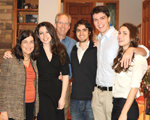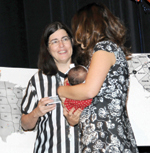|
By Cindy
Abole
Public Relations
On College of
Medicine Dean Etta Pisano's bucket
list is an unusual item. She wants
to write a play on the changing
role of women in society.
It's no wonder.
One of the strongest role models
in her life was her mother, who
was an electrical engineer running
an office of 30 men in charge of
computerizing the telephone
system. Unfortunately when she
married Pisano's father in 1955,
she lost her job.
"It was a
different time back then, but I'm
sure that must have been
incredibly difficult – to have to
choose between her professional
life and her personal life. I like
to think that if she had the
opportunity she would have
rejoined the workforce. My mother
passed away when I was 15 – and as
the oldest of seven children I
gained a lot of responsibility at
a young age. I believe that
experience shaped who I am to a
large degree."
It also
instilled in her a desire to stop
women from dying too young – and
that is one of the reasons she
selected breast cancer as an area
of focus. Pisano, M.D., is
regarded as an expert in the field
of women's imaging and recognized
among the top 20 most influential
people in radiology.
Pisano
certainly has learned to handle
tough issues within her area, at
her former institution, the
University of North
Carolina-Chapel Hill (UNC), and
throughout her life.
She made
history at MUSC in 2010 when she
became the institution's first
female medicine dean. Her
leadership comes at a challenging
time when deans in academic
medicine face pressure with
difficult issues, including state
funding cuts, reduced federal
research funding, doctor shortages
and the implementation of health
care reform.
Mark Sothmann,
Ph.D., vice president for academic
affairs and provost, is among
campus leadership works closely
with Pisano on a variety of
programs such as the College of
Medicine's progress with the
institution's new funds flow
financial model and alignment with
the 2010 Strategic Plan.
"Dr. Pisano has
one of the most difficult jobs at
any academic health center. The
challenges are immense with such
forces as the changing fiscal
climate and health care reform.
Being one of just a few women in
these positions nationally, her
successes at MUSC will be hugely
symbolic not just regionally but
across the country," Sothmann
said.
A
Strong Foundation
An accomplished physician and
researcher, Pisano has proven
herself as a pathfinder for
women's issues in academic
medicine and higher education.
Pisano credits
her parents, the nuns who helped
educate her as a child and other
successful professionals for
laying down a strong foundation.
Aside from her mother's influence,
she also learned much from her
father, a radiologist, who took
time to introduce her to several
female physicians who were
successful at balancing career and
family.
The mother of
four has been creative in making
the balancing act work for her
family.
 Dr. Etta Pisano with
husband, Dr. Jan Kylstra and
children Carolyn, Schuyler, Jimmy
and Marijke. Pisano is being
recognized as part of MUSC's
National Women's History Month. Dr. Etta Pisano with
husband, Dr. Jan Kylstra and
children Carolyn, Schuyler, Jimmy
and Marijke. Pisano is being
recognized as part of MUSC's
National Women's History Month.
"There was
often the perception that a woman
couldn't have a medical career and
be a wife and mother. As a junior
faculty member, I had to assert
myself to be allowed to work
part-time for several years while
I had young children at home. I
encountered resistance, because
that was not the norm. But it was
during those years that I got my
first grants and learned how to be
a researcher. They were incredibly
productive years."
During her
20-year tenure at UNC-Chapel Hill,
Pisano emerged as a passionate
voice and champion for women and
diversity projects. In 2007, she
founded the university's Working
on Women in Science program, an
initiative established to enhance
the recruitment, retention and
promotion of women faculty through
leadership training, mentoring and
networking. She led UNC's
Association of Professional Women
in Medical School and also chaired
UNC's Committee on the Status of
Women, addressing tenure clock
issues and gender-based salary
inequities among faculty.
 Dr. Pisano with
College of Medicine student
Danielle Bersabe during Match
Day. Dr. Pisano with
College of Medicine student
Danielle Bersabe during Match
Day.
The tenure
clock extension policy in higher
education is defined as an
adjustment of extra time granted
to a tenure-track faculty member
due to circumstances and
conditions in the management of
family responsibilities or health
issues.
"I believe it's
important that we accommodate life
changes for women and men – to
allow our faculty to have a career
and raise children. MUSC does not
have a 'tenure clock' for its
faculty, so there is not the same
degree of pressure that exists at
many other institutions for
faculty to move up or out. This
'tenure clock' time period
typically coincides with when
faculty would be having and
raising their children."
Wisdom
of crowds
As dean, Pisano is challenged with
attracting and retaining talented
women and minority recruits who
choose an academic career.
Within her own
college, she advocates for the
presence of women and minorities
in leadership groups, committees
and work panels.
"I'm a believer
in the wisdom of crowds. It's
important that a variety of
viewpoints are heard and that we
hear from people who think
differently –representing a
diversity of generations, race,
gender, background and specialty.
This is the key to making
well-reasoned decisions."
To maintain an
academic career pipeline for women
and minorities in her college,
faculty are encouraged to attend
professional development
conferences, participate in the
Executive Leadership in Academic
Medicine program or attend
Association of American Medical
Colleges workshops and meetings.
In the 21
months she has been dean, Pisano
and her team have achieved many
accomplishments. She and her staff
have recruited more than a dozen
department leaders, collaborated
with a faculty-led committee to
implement the college's Research
Strategic Plan and initiated the
Clinical Enterprise Strategic Plan
sponsored by the College of
Medicine, MUSC Physicians and
MUHA. She's guiding faculty and
staff in preparing for the medical
school's reaccreditation with the
Liaison Committee on Medical
Education scheduled for January
2013.
Pisano said she
has learned the importance of
striking a balance in her life and
recognizing her limitations. "It's
important to have strong support
systems, both in your personal
life and professional life. Reach
out and learn from others. Have
good mentors and be a mentor to
other people."
The taste panel
is one of the first
patient-focused efforts of the
Children's Hospital Wellness
Initiative, sponsored by the
Boeing Center for Children's
Wellness. Boeing donated $1
million to the Children's Hospital
last year to establish a center
aimed at promoting better health
among the state's young people.
According to
the National Association of
Children's Hospitals, 16.9 percent
of children and adolescents, ages
2 to 19, are obese.
Twelve children
were dubbed judges at the taste
panel. Parents and siblings of
patients also attended the
tasting. MUSC dietetic interns
collaborated with Sodexo to
organize a variety of foods that
were served to the children. By
choosing their favorites, their
selections will help to guide the
planning of the hospital's future
menu.
Clinical nutrition manager Mary
Basel said the event was a huge
success, and the children had fun
participating.
"Establishing
healthy eating habits is important
in the prevention and treatment of
medical issues. We decided to
conduct the taste panel so we
could educate children and their
parents on the importance of
nutrition, while allowing kids to
have a say in making healthier
choices."
Dr. Etta D.
Pisano
Dean of the College of Medicine;
Vice President for Medical
Affairs; Professor of Radiology
Education: Duke
University School of Medicine,
M.D. (1983); Residency, Radiology,
Beth Israel Deaconess Medical
Center (Harvard University);
Dartmouth College, Bachelor of Art
in Philosophy (1979)
Family:
Husband, Jan Kylstra; and four
children
Hobbies:
Reading, water sports, walking on
the beach, spending time with
family and friends, enjoying the
Charleston area
|



 Dr. Etta Pisano with
husband, Dr. Jan Kylstra and
children Carolyn, Schuyler, Jimmy
and Marijke. Pisano is being
recognized as part of MUSC's
National Women's History Month.
Dr. Etta Pisano with
husband, Dr. Jan Kylstra and
children Carolyn, Schuyler, Jimmy
and Marijke. Pisano is being
recognized as part of MUSC's
National Women's History Month. Dr. Pisano with
College of Medicine student
Danielle Bersabe during Match
Day.
Dr. Pisano with
College of Medicine student
Danielle Bersabe during Match
Day.